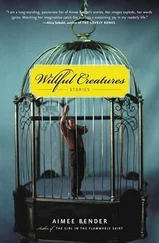Sure, said Joseph. Great.
We were loading boxes into the back of a Ford truck Mom had borrowed from friends at the lumberyard. Joseph dipped back into the house, and returned with two card-table chairs under his armpits. Grandma had sent the rest of the folding set over a series of months, in those long slatted boxes, one at a time.
How about these; can I have these? he asked, holding them up like crutches.
Mom wrinkled her nose. Those? she said. They’re not very well made, she said.
Joseph took two, and then the next two, and then the folding table, and then Grandma’s cracked bamboo salad bowl, and her brass desk lamp with its movable neck. Not as nice as your stuff, of course, he said, walking to the truck and loading it all inside.
The plan was that he would start with a roommate, to share his one-bedroom, but during the interviews of various contenders he sat still as a stone and said nothing. Peppy strangers came to the house and sat with me and my mother, trying to impress, but you could see their mood sink when they tried to engage Joseph and he didn’t answer one of their questions. He didn’t even grunt. He was worse than I’d ever seen him, radiating Get Away because what he seemed to want more than anything was to live alone. He was glad to go to LACC, he said, yes. He only wanted adequate time to work. Why do you want to live alone so much? I asked, but he pretended like he didn’t hear me. Are we so awful? I said, trailing him from room to room. He’d only applied to the schools where George had also applied, and his former ravenous wish for Caltech began to seem to me less about the merits of the school itself and more about the one and only roommate he could’ve tolerated.
Mom, in an effort to be helpful, rented the whole apartment under her own name, and she’d wanted to pick a nice roommate to keep Joseph company, and she even tried to give a few possible people generous breaks on the rent, but when each potential eager-eyed roomie drizzled off, smiles stiffening, Joseph begged her again. He asked if he could use his savings, donated by the generous dead grandparents, to pay the extra rent, and after two more people withdrew their names, Mom talked it over with our father and relented. Fine, she said. But you have to call every single day, she said. She stared him down until he bowed his head, yes. She worried he was devastated from the Caltech rejection, but as soon as she handed over the key, he looped his arm through hers. It’s mine? he said. He danced around the house with their arms linked, singing thank you, Mom! thank you, Mom!-his elbows pointy, his voice ringing. She whooped with him, teary, laughing. Call your father, she said, wiping her cheeks, and he got on the phone, also something I’d never seen before, and called Dad at the office to leave a proper thank-you message with his secretary. When he was off, he did another little bow and promised Mom he’d still come over every Sunday night for the splinters.
He’s coming into his own, she whispered to me, kissing my cheek.
So that the grandparent fund could stay untouched, she paid the rent for the full apartment from her co-op sales, augmented by my father’s salary. No one made any mention of him getting a job.
On moving day, we lugged the co-op furniture and the boxes up the stairs and down the balcony corridor. Once all was unloaded, Mom and I stood around the apartment. Opened and closed his cabinets. Admired the closet space. I flushed the toilet, for entertainment.
Looks very nice! Mom said. She slid open the living-room window to let air in. Peered out his front door. Have you met your neighbors yet?
The rows of doors down the outside hallway were all shut, curtains drawn.
We stood awkwardly in his living room, and Joseph thanked us several times, finally ushering us to the doorway. He kept swinging the door closer to closed.
We get it, I said, stepping out. Bye.
Every day, Mom told him.
Yes.
She gave him another hug, and blew her nose. After he shut the door, she rummaged in her purse and dropped a magenta-colored spare key inside the metal tray of the outside light fixture.
Just as a backup, she said, as we walked down the stairs.
George threw himself into college, and Joseph lived a hermit’s life, and I went through the cycles: Eighth grade. Ninth grade. Tenth, eleventh, twelfth. I clung to Eliza, who, despite her promise to George, had found a new group of friends, girls who seemed, with their broad smiles and quicknesses, to be like bicyclers rolling downhill. Like they lived in a miraculous Escherian land that only offered downhills.
At lunch, the group of them had started to talk about colleges. Eliza had her heart set on Berkeley, majoring in psychology. Several others were interested in political science, or pre-med. I had just applied to a couple of places, almost at random; the idea of more school just seemed confusing to me. Who could bear to pay attention all the time? I kept up my weekly flute lessons so I could play in the school orchestra, but I was content as third chair, and I often wished I’d picked trombone. You can’t blast a flute. My old dodgeball rival Eddie Oakley had grown up to be a jock with nice strong arms, and on occasion, when I was feeling particularly agitated, I ran out to the baseball field at the end of the day and I convinced him to throw broken tennis balls with me over wire fences to roll in the streets. Take that, I said, sending them soaring.
You’re an angry gal, he said, laughing at me.
I’m not angry, I said. I just have a good arm.
A couple times he and I made out outside the boys’ locker room, long after the school day had ended. We pushed our faces into each other. There was something rude and bruising about it, like I was mad at him and he was mad at me and we were having a fight with our lips, but somehow it all still felt pretty good. He tasted like sports. One afternoon, just as it was getting dark, he tucked a hair behind my ear and seemed ready to say something nice; I ducked out of his arms and told him I had to go.
He pulled me in for one last kiss, which lasted for another fifteen minutes. At a pause, I tucked in my shirt.
Bye, I said. I’m going.
You’re the perfect girl, he said, rubbing his chin. You expect nothing.
I scooped up one of the old tennis balls and threw it at him.
And you, I said, are the same asshole you were in third grade.
What? he said, making a mock-innocent face. It’s true, right? It’s good! Tomorrow, same time?
Maybe, I said, walking away.
He chuckled. Maybe, he said. Of course.
During lunchtime, while the downhill girls talked about where they would go to school, and when, and why, I sat on the outskirts of their circle, where grass met concrete, eating my lunch. I watched the science nerds over on a bench, with their books open. Like regurgitated versions of my brother and George.
Hey, how come you only eat junk food? asked one of Eliza’s friends, the strawberry-blonde who was president of the tennis club. She lived entirely on celery and peanut butter. I was right at the edge of their circle, like the tail of a Q , and I swiveled my butt to face her directly.
Eliza looked over, listening, waiting. She had a big crush on the student-body president and wanted to ask the tennis-club girl about the latest sighting in the hall.
Because I can taste the feelings people don’t know they’re feeling, I told her. And it is an absolutely shit experience, I said.
I raised my eyebrows and glared.
Jeez, said the girl, turning back. I was only asking. Is Eddie Oakley your boyfriend?
No, I said.
Someone saw you guys making out by the tennis court.
Wasn’t me, I said.
Rose is really good at dodgeball. And Spanish, Eliza offered. I think Eddie’s okay.
Читать дальше












